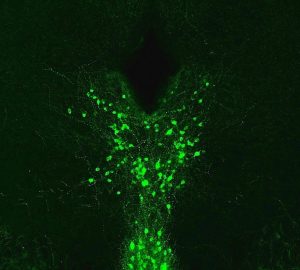Researchers in the UNC School of Medicine Lab of Thomas Kash, PhD, published new findings in the journal Neuron showing how neurons in two brain regions use dopamine to promote pain responses differently in male and female mice.

Males and females, generally speaking, experience and respond to pain differently, but scientists have yet to understand all the brain circuits involved in these differences. Now, new research from the UNC School of Medicine lab of Thomas Kash, PhD, shows how neurons use dopamine to regulate pain differently in male and female mice. Waylin Yu, PhD, former graduate student in the Kash lab and current postdoctoral researcher at UC San Francisco., is first author.
The discovery, published in the journal Neuron, could help the scientific community devise better pain management strategies, particularly for women, who are disproportionately affected by pain throughout their lifespans.
“We focused on this neural pathway because our previous work and that of others show that specific neurons release dopamine to regulate pain responses.”Unfortunately, that research was done only in male mice. So we decided to look at both male and female mice, and what we found was very surprising.” ~Tom Kash
“We found that activating this pathway reduced pain sensitivity in male mice, but made female mice move more, especially in the presence of something capturing their attention. We think this is because of the different ways males and females respond to pain.” ~Waylin Yu
In particular, these experiments seem to indicate that dopamine helps males simply not feel as much pain, while in females, dopamine helps the mice focus attention elsewhere while in the presence of pain.
Other authors on the Neuron paper are Dipanwita Pati, PhD, postdoctoral fellow; Melanie Pina, PhD, postdoctoral fellow; Karl Schmidt, PhD, a postdoctoral fellow in the UNC Department of Psychiatry; Kristin Boyt, senior research analyst in the Kash lab; Avery Hunker, PhD, and Larry Zweifel, PhD, both at the University of Washington; and Zoe McElligott, PhD, assistant professor of psychiatry at the UNC School of Medicine. Thomas Kash is a member of the UNC Bowles Center for Alcohol Studies.
~The above are excerpts from the original article by Mark Derewicz published March 18, 2021 in Vital Signs UNC HealthCare/SOM News – read the full article here.
